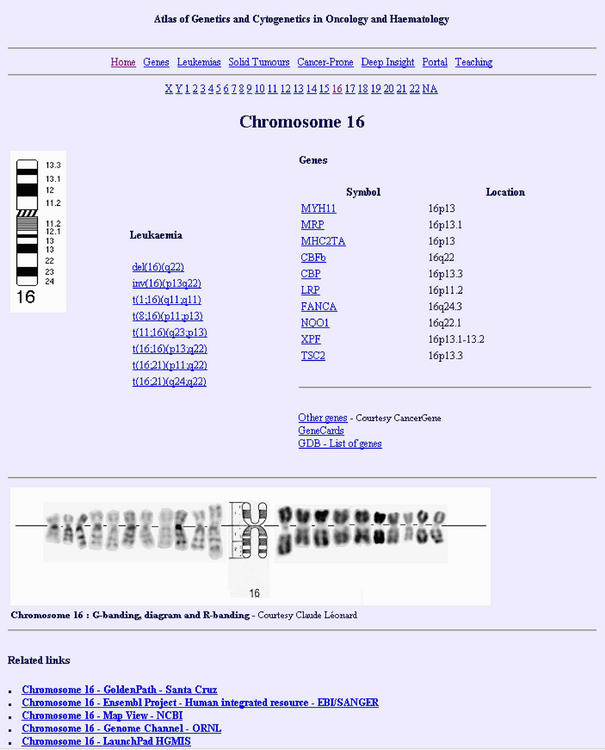Abstract
The ‘Atlas of Genetics and Cytogenetics in Oncology and Haematology’ (http://www.infobiogen.fr/services/chromcancer) contains concise and updated cards on genes involved in cancer, cytogenetics and clinical entities in oncology, and cancer-prone diseases, a portal towards genetics/cancer, and teaching materials in genetics. This database is made for and by researchers and clinicians, who are encouraged to contribute. The Atlas is part of the genome project and it participates in research on cancer epidemiology.
INTRODUCTION
The ‘Atlas of Genetics and Cytogenetics in Oncology and Haematology’ http://www.infobiogen.fr/services/chromcancer is an internet database aimed at genes involved in cancer, cytogenetics and clinical entities in cancer, and on cancer-prone diseases (1–3). This database is made for and by researchers and clinicians, but it also reaches students in Medicine and Sciences. Contributions are reviewed before acceptance.
DATABASE STRUCTURE
Cards
Cards are well structured papers which represent the body of the Atlas. Cards on genes include data on: DNA/RNA, protein, mutations and diseases. Cards on cytogenetic/clinical entities include data on: clinics, cytogenetics, genes, hybrid gene and fusion protein. Cards on cancer-prone diseases include data on: inheritance mode, clinics, neoplastic risk, cytogenetics, genes and proteins, mutations. Cards also include hyperlinks towards MEDLINE, and towards the main complementary databases (nomenclature, cartography, gene structure, transcripts, proteins, domain families, diseases, mutations, probes).
Deep insights/case reports
Deep insights are more traditional review articles. The Case Reports Section is dedicated to rare cytogenetic entities of leukemia (less than 30 cases) to document these poorly known entities, to further delineate their epidemiology, including the associated prognosis: the Atlas intend to provide new information in cancer epidemiology.
Portal
The portal developed previously (http://www.infobiogen.fr/services/chromcancer/dblinks.html) towards Internet databases, sites and journals devoted to genetics and/or cancer has been updated with numerous links to new resources as soon as they appeared Goldenpath (http://genome.ucsc.edu/), Ensembl (http://www.ensembl.org/), SNP (http://snp.cshl.org/), transcriptome or proteome… . Moreover, our pages classified by chromosome point towards resources dedicated to mapping, probes, sequences, genomics and transcriptome databases (Fig. 1). We have also developed a page towards the 100 journals in Genetics and/or Cancer, with specific pages on both the lattest issue and the archives, with indications on free access when available.
Figure 1.
Chromosome 16 page (top part). Translocations and genes involved in cancer: list and internal hyperlinks towards Atlas cards. Diagram of chromosome 16. 10 or more examples of chromosome 16 with G-banding and with R-banding. Top part of the portal for chromosome 16 with external hyperlinks towards the main mapping resources, probes, sequences, genomics and transcriptome databases. Full chromosome 16 page in: http://www.infobiogen.fr/services/chromcancer/Indexbychrom/idx_16.html.
Teaching materials
Educational items in Genetics are being developed in English, French, German, Portuguese and Spanish, and we are (still) looking for an Italian translation. We are happy that some Universities already use the Atlas for teaching; they can also provide us with more authors.
COMMENTS
The Atlas is a peer reviewed on-line journal and database indexed by the Current Contents. More than a 220 collaborators are contributing and more than 600 papers are available. More than 17000 individual machines connect each month.
The Atlas is part of the genome project and participates in the research in cancer epidemiology. The Atlas is at the crossroads of research, university and post-university teaching (virtual medical university), and telemedicine. It contributes to ‘meta-medicine’, this mediation, using new information technology, between the overflowing information provided by the scientific community and the individual practitioner.
Contributions and collaborations are most welcome. It will serve the entire community of clinicians, researchers and students.
Acknowledgments
ACKNOWLEDGEMENTS
The Atlas is funded by: Ministère de la Recherche, Ministère de l'Education Nationale, Département de la Vienne, Communauté d' Agglomération de Poitiers, Ligue Nationale contre le Cancer (Charente, Cher, Corrèze, Indre, et Poitou-Charentes), and benefits from INFOBIOGEN resources.
REFERENCES
- 1.Huret J.L., Dessen,P. and Bernheim,A. (2001) Atlas of Genetics and Cytogenetics in Oncology and Haematology: 2001 update. Nucleic Acids Res., 29, 303–304. [DOI] [PMC free article] [PubMed] [Google Scholar]
- 2.Kaiser J. (2001) Fingerprinting a killer. Science, 292, 1803. http://www.sciencemag.org/cgi/content/summary/292/5523/1803b. [Google Scholar]
- 3.Pearson H. (2001) Lifelines—browsing the cancer catalogue: 2001 update. Nature Sci., http://www.nature.com/nsu/010531/010531-8.html#. [Google Scholar]



